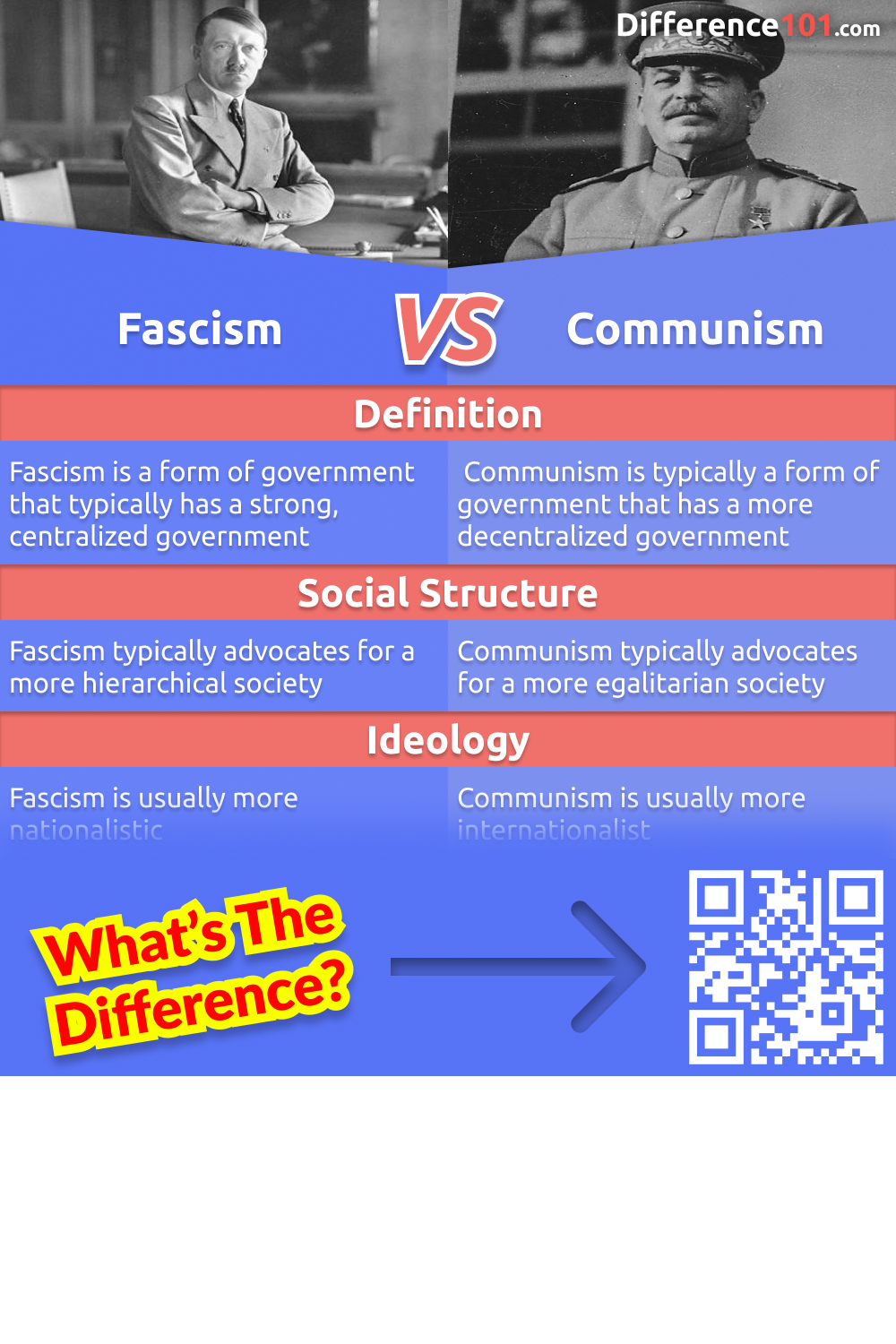Fascism and communism are two very different political ideologies. Fascism is a right-wing ideology that believes in the supremacy of the state over the individual. Communism, on the other hand, is a left-wing ideology that believes in the equality of all people.
So, what is the difference between fascism and communism? Well, let’s take a closer look at each ideology to find out.
Fascism believes in a strong, centralized government that controls all aspects of society. The government is led by a dictator who has absolute power. Fascism promotes nationalism and often uses violence to achieve its goals.
Communism, on the other hand, believes in a classless society where all people are equal. The government is run by the people, for the people. There is no private property in communism, and all resources are shared equally.
The main difference between fascism and communism is their beliefs about the role of government.
Table of Contents
What Is Fascism?

Fascism is a political ideology that emphasizes the need for a strong, central government and national unity. Fascists believe that a nation is strongest when its people are united under a single, strong leader. They advocate for strict controls on society and the economy, and often use violence and intimidation to achieve their goals. Fascism typically includes elements of nationalism, racism, and anti-communism. Fascism rose to prominence in Europe in the early 20th century, and was a major force in World War II.
What Is Communism?

Communism is an economic and political system in which property and resources are communally owned and distributed equally. This system is based on the belief that everyone should work according to their abilities and be rewarded based on their needs. Communism has been tried in several countries, but it has never been fully implemented. Critics argue that Communism is impractical and leads to dictatorship and oppression.
Key Differences Between Fascism And Communism
There are a few key differences between Fascism and Communism. For one, Fascism is a form of government that typically has a strong, centralized government, while Communism is typically a form of government that has a more decentralized government. Additionally, Fascism typically advocates for a more hierarchical society, while Communism typically advocates for a more egalitarian society. Finally, Fascism is usually more nationalistic, while Communism is usually more internationalist.
Fascism vs. Communism Similarities
There are a few key similarities between fascism and communism. Both ideologies seek to control the masses and create a utopian society. They both advocate for a strong central government and a single party system. In addition, they both suppress individual rights and freedoms in favor of the collective good.
- Both Fascism and Communism are ideologic and totalitarian regimes.
- Both Fascism and Communism were characterized by ruthless suppression of opposition.
- Both Fascism and Communism led to social and economic setbacks.
Fascism vs. Communism Pros and Cons
Fascism Pros & Cons

Fascism Pros
Fascism is a political ideology that rose to prominence in the early 20th century. Fascism typically embraces strong autocratic leaders, aggressive nationalism, and a commitment to maintaining traditional social hierarchies. Fascism has been associated with totalitarianism, and it has been used as a tool for repression by dictatorial regimes. However, fascism also has been praised for its commitment to order, its defense of traditional values, and its promotion of economic development.
- Fascism makes government more efficient and responsive to public needs
- Fascism can make government less wasteful and more responsive to the needs of citizens
- Fascism can also make government less corrupt
- Fascism makes government more responsive to public needs
Fascism Cons
Fascism is a political ideology that rose to prominence in the early 20th century. Fascism typically includes extreme nationalism, totalitarianism, anti-communism, and other far-rightwing ideologies. Disadvantages of fascism include its repressive and dictatorial nature, as well as its propensity for aggressive and expansionist foreign policy. Additionally, fascism often leads to economic decline and instability, as well as a general deterioration of civil liberties and human rights.
- The fascists’ propaganda is full of lies
- Fascism is an authoritarian form of government
- The fascist’s propaganda manipulates the public into supporting them
- Fascism leads to more war, more misery, more death and destruction
- Fascism leads to more poverty
- Fascism leads to more suffering
Communism Pros & Cons

Communism Pros
There are many advantages and pros to communism. One of the main advantages is that it creates equality among citizens. In communism, everyone is given the same opportunities and resources, which helps to reduce crime and poverty. Communism also allows for the fair distribution of resources, so that everyone has what they need to live a comfortable life. Another pro of communism is that it can lead to a more efficient economy, since there is no competition among businesses. Communism also encourages people to work together for the common good, which can lead to a strong sense of community.
- It is more equalitarian in nature
- No private property
- People do not have to work
- No competition
- No need for money
- People get whatever they need
Communism Cons
There are a number of disadvantages and criticisms of Communism. Critics argue that Communism is not compatible with democracy, individual freedom, or capitalism. They also argue that Communist regimes have been responsible for a number of human rights violations. Additionally, some argue that Communism has not been successful in achieving its goals of economic equality and social justice.
- No privacy
- No healthcare
- No free education
- No entertainment
- No job security
- No private property
- No freedom of speech
- No freedom of religion
Comparison Chart

Comparison Video
Conclusion
In conclusion, Fascism and communism are two forms of dictatorial regimes that seek to control all aspects of society. The difference between the two is that the fascist regime utilizes violence to further its cause whereas communism is achieved through imposing restrictions on the people.







